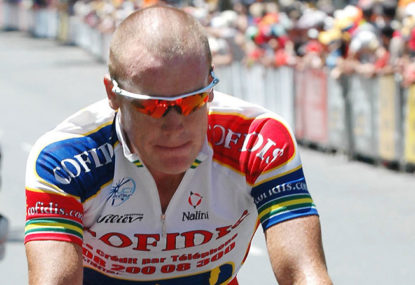'I've just won a stage of the Tour de France, mate!': Hindley grabs yellow jersey as Aussie blows Tour apart
Australia's Jai Hindley has said he is "lost for words" after a shock stage victory at the Tour de France earned him the leader's…

Sunday night’s edition of The Bike Lane on SBS served as a reminder of the complexities that are inherent in debating just what we should do with those who do not conform to society’s rules.
At the heart of the debate surrounding Stuart O’Grady’s role as co-presenter on The Bike Lane are questions of just how do we punish former dopers and what is punishment anyway?
William Shakespeare used the parting words of the Prince in Romeo and Juliet to remind us that punishment takes many forms. All of the surviving Montagues and Capulets are punished through the deaths of Romeo and Juliet. There is no greater punishment the Prince can dole out, hence his cry “All are punish’d”.
This question of punishment is at the heart of Stuart O’Grady’s return to the cycling fold. On Sunday night we saw O’Grady’s public punishment in what was at times a difficult interview to watch, but a necessary one if O’Grady is to be held accountable for his actions.
Many athletes in their early years, if not throughout their careers, receive taxpayer money to support them as they follow their dreams, so it’s only right that they are held publicly accountable for their actions.
The host of The Bike Lane, Matthew Keenan, began the show by addressing “the elephant in the room” that is O’Grady’s doping admission. Keenan clearly laid the show’s values on the table by arguing that O’Grady can teach us much about the dangers of doping in professional sport.
The argument that sports can benefit from those who have made mistakes is a reasonable one, but it often fails to address that doping results in cheats prospering. The honest athlete may have their integrity intact but are often consigned to the realm of nobodies. Dopers get away with the prize money, the trinkets, the fame and the media career, while the honest, clean athlete fades from our memories.
However, exiling the dopers may be a pointless process, especially if the same old cycles of doping continue.
Melbourne academic Craig Fry recently argued that Stuart O’Grady’s inclusion as co-host of The Bike Lane undermines doping prevention programs. Ultimately, cheats continue to prosper is the message here. Fry has a point, but watching O’Grady highlighted that this was also about public punishment.
O’Grady was clearly uncomfortable with having to admit his dream retirement and plans of breaking the record for the most Tour de France appearances was shattered due to his own stupidity. But there were traces of defiance, too, when he brought out the old “you don’t know what I’ve been through” chestnut. Nevertheless, O’Grady did display palpable remorse, and this is what his disappointed fans wanted to see.
Regardless of where you sit on the ‘should ex-dopers be allowed back into the fray’ fence, having to justify your existence on national television is a punishment within itself.
In light of all we know about O’Grady’s doping, should he be excommunicated from the Australian sporting landscape? Will we, in some bizarre homage to Nathaniel Hawthorn, force him to wear a scarlet D for life?
O’Grady’s whole career cannot be judged on his actions in 1998, unless there is proof that he doped his whole career. Even though he may not have cheated on Lance Armstrong’s scale, like all dopers, he cheated his competitors and his fans in 1998.
O’Grady may well have lived with the fear of his secret coming out for 15 years and confessing his cheating to his family may have personally been the worst punishment for him, but being held publicly accountable for his actions is the punishment cycling fans needed and deserved.
Unless new evidence comes to light that O’Grady was a career doper, and he doped to win his Olympic and Commonwealth Games medals, his Paris-Roubaix win or any of his other achievements, there is little point in taking them off him. That would not be a fair punishment if he won them cleanly – and based on all available evidence he did.
In all of this, however, we shouldn’t forget that the real victims of doping in sport are not the repentant athletes, but the clean athletes who were cheated out of their careers, including lucrative media deals in retirement.
These are the real victims of doping in sport.